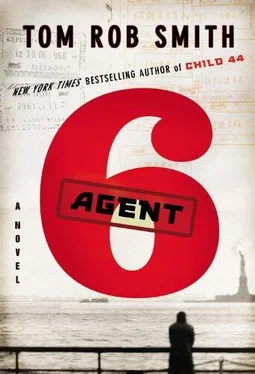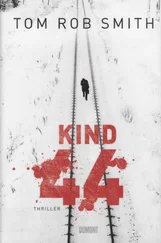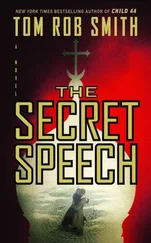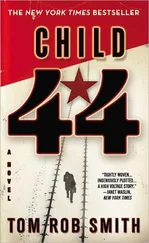Tom Smith - Agent 6
Здесь есть возможность читать онлайн «Tom Smith - Agent 6» весь текст электронной книги совершенно бесплатно (целиком полную версию без сокращений). В некоторых случаях можно слушать аудио, скачать через торрент в формате fb2 и присутствует краткое содержание. Жанр: Триллер, на английском языке. Описание произведения, (предисловие) а так же отзывы посетителей доступны на портале библиотеки ЛибКат.
- Название:Agent 6
- Автор:
- Жанр:
- Год:неизвестен
- ISBN:нет данных
- Рейтинг книги:4 / 5. Голосов: 1
-
Избранное:Добавить в избранное
- Отзывы:
-
Ваша оценка:
- 80
- 1
- 2
- 3
- 4
- 5
Agent 6: краткое содержание, описание и аннотация
Предлагаем к чтению аннотацию, описание, краткое содержание или предисловие (зависит от того, что написал сам автор книги «Agent 6»). Если вы не нашли необходимую информацию о книге — напишите в комментариях, мы постараемся отыскать её.
Agent 6 — читать онлайн бесплатно полную книгу (весь текст) целиком
Ниже представлен текст книги, разбитый по страницам. Система сохранения места последней прочитанной страницы, позволяет с удобством читать онлайн бесплатно книгу «Agent 6», без необходимости каждый раз заново искать на чём Вы остановились. Поставьте закладку, и сможете в любой момент перейти на страницу, на которой закончили чтение.
Интервал:
Закладка:
The captain nodded.
– But not for me.
*
Leo sat on the steps of a house, looking down at the paper bag of sticky sugar-coated almonds. A fly landed, sticking to the nuts, legs flailing, wings congealed with sugar and syrup.
The hidden troops emerged, guns ready. The captain set off, leading his team, intent on making his arrest and sending his powerful statement to the city. Leo closed his eyes, listening to the screech of the tyres, the commotion in the market. There was screaming, shouting, a mixture of Russian and Dari. Shots were fired. Leo stood up. Beside him was the figure of Nara, perhaps the loneliest-looking person he’d ever seen.
Together, they walked towards thdabout, past the blockade of soldiers, into the crowded market area, arriving at the same time as a helicopter circling low above them. The wind from its blades caught the tarpaulin tops of the market stalls and they filled out like sails. Some turned over, spilling their produce. Leo checked on the eggs. They were smashed, shell and yolk on the ground.
Leo and Nara passed through crowds of Afghans, many on their knees, hands behind their heads, gun barrels pressed against their backs. The man who’d sold him pomegranates looked up at him, full of hatred. With the invasion, Leo could no longer hold a position in the margins, ignored and irrelevant, unseen, living an invisible existence. No longer a ghost, he was the face of the occupation as much as the zealous captain.
The suspect was not dead. The Afghan and Soviet soldiers had cornered him in a space not far from a spice stall. He’d been shot in the arm: his hand was dripping blood. Nara touched Leo, remaining behind him, hidden from the suspect. Leo asked, already knowing the answer:
– Was this the man that attacked you?
She nodded.
The suspect lifted up his shirt. Several plastic bags were attached to his torso – the kind used by juice stalls. They were leaking, liquid pouring down his body, soaking his clothes. Then a spark and a flame appeared in his hand, a burning match produced from nowhere. He slapped his trousers and the material caught alight, flames spreading to his shirt, the bags ablaze. In a second he was engulfed. His beard turned to fire. His skin shrank from his bones. The pain became too much and he ran from side to side, arms flailing, flames leaping into the sky. One of the soldiers raised his gun to kill him. The captain pushed the barrel down.
– Let him burn.
The suspect burned, eventually collapsing to his knees. The flames died down, the gasoline exhausted. He continued to move, less like a human, more a smouldering corpse animated by dark magic, coming to rest under one of the tables laden with spices. The table began to cook, spice pods popping in the heat. The air reeked, burnt flesh and sumac spice. Leo’s eyes followed the unusual coloured smoke into the sky, wisps of blues and greens. At every window, as far he could see, there were faces, young boys, young men, the spectators that the captain had so eagerly wanted for the arrest.
In the tea rooms old men clutched their glasses, cigarettes between their fingers, as calm as if they’d seen this all before and were sure they would one day see it all again.
The Border of Laghman and Nangarhar Provinces The Village of Sokh Rot 116 Kilometres East of Kabul 9 Kilometres West of Jalalabad
Since she was only seven years old, weaving a carpet was considered too difficult for Zabi, so instead she’d spent the morning making two of the colours used in dyeing the fabric. Her nails were stained red from crushed pomegranate rinds. She sucked her fingertip, curious that a colour should have a particular taste: red tasted of sour fruit juice even more bitter and sharp than the foul chai-e-siay , the black tea her father drank every morning, stewed so strong it left a smudge around the glass rim. The second urn contained a brown dye, created by grinding walnut husks, more laborious to produce than red. She had to crack the husks, then crunch them to powder with a smooth stone, adding a little warm water, mixing the two together. She dabbed a spot on the end of her tongue. The brown husk paste had its own particular grainy texture but not much of a taste. She decided the colour brown was less of a taste, more of a texture, before deciding that this train of thought was proof that she was bored.
Her mother and her khaha khanda, her group of close female friends, were sitting in a tight circle, talking while they crafted their patterned carpets. Some were intended for personal use, most were to be sold. Zabi was supposed to watch and learn. Making dye had been fun for a while, but her arms ached from crushing the husks and her mother was nowhere near finished. They would be working at the carpets for the entire day and perhaps tomorrow too and even the day after that. A square of sunlight appeared on the floor. The clouds had cleared. She wanted to go outside, aware that if she asked she’d be refused permission. Nervous of being told off, she edged along the floor, towards the door, collecting the steel urn that she’d been using to mix the paste.
– I need some more water.
Without waiting for a reply she ran out, full of mischievous energy, bare feet fast across the smooth mud path, running past the houses and out of the village.
Her village was set among orchards that fanned out in every direction – the entire valley was green and lush, filled with trees planted so that there was always a new crop coming into season – almonds, walnuts, apricots, apples and black plums. Each orchard was watered by an irrigation system. A deep channel lined with concrete brought water from the mountains, gushing at speed before dividing into a smaller network that spread out across the orchards. According to her father, as a consequence of their ingenuity the village of Sokh Rot was one of the richest in the region, famous for its crops and a grand procession of mulberry trees that welcomed visitors when they travelled up the main road into the village centre.
Despite the beauty of their surroundings, Zabi was the only girl who liked playing outside. Laila and Sahar were sometimes outside but they were only three years old and never ventured much beyond the perimeter of their houses, mostly feeding the goats. The other girls, the older girls, spent their time inside. When they did leave the house they were dressed formally and always on a specific errand, never to play. Zabi could sit with them inside, with her mother, enjoying their stories. And she admitted that sometimes it was fun to be inside, if it was cold or raining, and sometimes it was fun to bake, to cook, stitch and make dyes for carpets, but not all the time, not every day.
She stopped running, far enough away from the village not to be called back. She was still carrying the steel urn and she placed it down, at the foot of the largest apricot tree in the centre of the field third away from her village. She didn’t have any shoes on. It didn’t matter. She didn’t feel cold. Walking through the trees she thought upon something her mother had recently said: You are almost a woman now.
Being called a woman sounded like a compliment. Even so, the remark had troubled her. The women in the village never played outside, never ran through the orchards and never climbed the trees. If being a woman meant doing none of those things, she’d prefer to remain girl.
Nearing the outskirts of the orchards, she stood by the main irrigation channel that carried water down from the mountains. The channel was wide and deep: the flow was rapid. She picked up a leaf and dropped it on the surface, watching it speed away. No excuse about fetching water was going to spare her a telling-off. She’d be smacked. That didn’t bother her. The punishment she feared more than anything else was to be told that she would never be allowed to go outside. She looked up, mournfully staring at the mountains and wishing that one day she could climb them right to the very top and look down on the valley.
Читать дальшеИнтервал:
Закладка:
Похожие книги на «Agent 6»
Представляем Вашему вниманию похожие книги на «Agent 6» списком для выбора. Мы отобрали схожую по названию и смыслу литературу в надежде предоставить читателям больше вариантов отыскать новые, интересные, ещё непрочитанные произведения.
Обсуждение, отзывы о книге «Agent 6» и просто собственные мнения читателей. Оставьте ваши комментарии, напишите, что Вы думаете о произведении, его смысле или главных героях. Укажите что конкретно понравилось, а что нет, и почему Вы так считаете.












